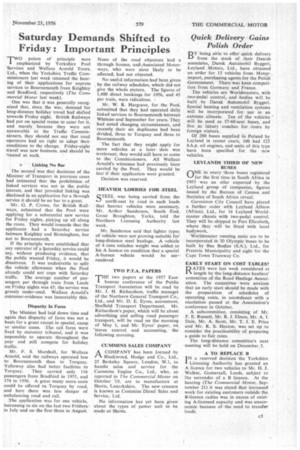Saturday Demands Shifted to Friday : Important Principles
Page 45

If you've noticed an error in this article please click here to report it so we can fix it.
T"points of principle were emphasized by Yorkshire Pool Services and Wallace Arnold Tours, Ltd., when the Yorkshire Traffic Commissioners last week resumed the hearing of their applications for express services to Bournemouth from Keighley and Bradford, respectively (The Commercial Motor last week).
One was that it was generally recognized that, since the war, demand for long-distance holiday travel had shifted towards Friday night. British Railways had put on special trains to cater for it, and merely because they were not answerable to the Traffic Commissioners, they should not say that road operators had no right to adapt their conditions to the change. Friday-night travel was new business, and should be *reated as such.
• Linking No Bar The second was that decisions of the Minister of Transport in previous cases had intimated that the prohibition of linked services was not in the public interest, and that provided linking was disclosed in an application for a through service it should be no bar to a grant Mr. G. P. Crowe, for British Railways, submitted that the Pool were applying (or a substantial new service for Friday nights, picking up all along the route. They would concede that the applicants had a Saturday service between Keighley and Birmingham, but not to Bournemouth.
If the principle were established that any operator of a Saturday service could say, without producing evidence, that the public wanted Friday, it would be disastrous. It was undesirable to split the vehicle allowance when the Pool already could not cope with Saturday traffic. The average number of passengers per through train from Leeds on Friday nights was 45: the service was grossly under-used. Wallace Arnold's customer-evidence was lamentably thin.
Disparity In Fares The Minister had laid down time and again that disparity of fares was not a basis for a grant except in special, camp or similar cases. The rail fares were fixed by statutory tribunal, and it was impossible to operate throughout the year and still compete for holiday traffic.
Mr. F. S. Marshall, for Wallace Arnold, said the railways operated less to Bournemouth than to Torquay. Yelloway also had better facilities to Torquay. They carried only 116 passengers from Bradford in 1955, and 174 in 1956. A great many more seats could be offered to Torquay by road, and here there was less danger of unbalancing road and rail.
The application was for one vehicle, increasing to six on the last two Fridays, in July and on the first three in August. None of the road objectors had a through licence, and■Associated Motorways, who were most likely to be affected, had not objected.
No useful information had been given by the railway schedules, which did. not give the whole picture. The figures of 1,400 direct bookings for 1956, and 45 per train, were ridiculous.
Mr. W. R. Hargrave, for the Pool, submitted that they had operated daily linked services to Bournemouth between Whitsurt and September for years. They had noted changing circumstances, and recently their six duplicates had been divided, three to Torquay and three to Bournemouth.
The fact that they might apply for more vehicles at a later date was irrelevant; they would still have to come to the Commissioners. All Wallace Arnold's witnesses had previously been carried by the Pool. They would be lost if their application were granted.
Decision was reserved.
HEAVIER 'LORRIES FOR STEEL
STEEL was being carried from the north-east by road in such loads that heavier vehicles were necessary, Mr. Arthur Sanderson, South End, Great Broughton, Yorks, told the Northern Licensing Authority last week.
Mr. Sanderson said that lighter types of vehicle were not proving suitable for long-distance steel haulage. A vehicle of 4. tons unladen weight was added to his A licence (TTI condition that a special A-licence vehicle would be surrendered.
TWO P.T.A. PAPERS
THE two papers at the 1957 East' bourne conference of the Public Transport Association will be read by Mr. J. H. Richardson, traffic manager of the Northern General Transport Co.. Ltd., and Mr. D. E. Eyres, accountant, Sheffield Transport Department. Mr. Richardson's paper, which will be about advertising and selling road passenger transport, will be read on the morning of May I, and Mr. Eyres' paper, on. 'stores control and accounting, the following morning.
CUMMINS SALES COMPANY
A COMPANY has been formed by r-v Blackwood. Hodge and Co., Ltd., 25 Berkeley Square, London, W.I, to handle sales and service for the Cummins Engine Co.. Ltd., who, as reported in The Commercial Motor on October 19, are to manufacture at Shotts, Lanarkshire. The new concern is known as Cummins Diesel Sales and Service, Ltd.
No information has yet been given about the types of power unit to be made at Shotts.
















































































































